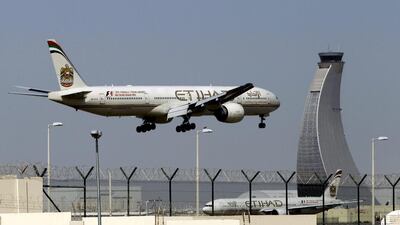Etihad Airways chief Tony Douglas said the airline is “on track” with its ongoing turnaround plan but work remains to be done after the carrier narrowed annual losses by 16 per cent to $1.28 billion (Dh4.7bn).
The core airline's loss shrank after it reduced costs by nearly half a billion dollars amid "challenging" market conditions and a 31 per cent increase in fuel prices, Etihad Airways said in a statement on Thursday. Total revenue at the airline unit dropped 3.2 per cent in 2018 to $5.9bn from a year ago.
"We are on track but we still have an awful lot to do," Tony Douglas, chief executive of Etihad Aviation Group, said in an interview with The National on Thursday. "We've got a 34 per cent [operating performance] improvement over the last two years since we started running our transformation programme, but we openly acknowledge that there is an awful lot to be done."
Etihad Airways began a five-year turnaround plan in 2017 - when Mr Douglas was hired - that has reduced overhead costs, dropped unprofitable routes, cut jobs and restructured plane orders. The Abu Dhabi-based carrier slashed total costs in 2018 by 5.5 per cent, to $6.9bn, year-on-year.
As part of its strategic review the airline is going "back to basics" with a disciplined approach to its operations and agile response to market demand.
The airline will offer passengers customised services for a fee, continue to drop unprofitable routes and re-configure economy-class on its narrow-body plans to maximise yields, as part of the plan to cut costs and boost revenues, Mr Douglas said.
Etihad Airways is working on re-designing economy class to add newer seats and upgrade the technology for its onboard entertainment system, which will be revealed within months.
"What we're doing is enhancing the experience whilst getting a tighter commercial return from a yield point of view," Mr Douglas said.
The carrier will also offer "bespoke" services that will allow customers more flexibility "to choose an economy seat with extra leg-room or a business-class meal with first-class pyjamas," he said.
Etihad Airways will continue to "take decisive action" to axe unprofitable routes but also add new destinations where there is market demand amid a week-by-week analysis of its network, he said.
Under the turnaround plan, the airline is working on more than 700 individual projects to reduce cost and improve revenues with a timetable for execution and a monthly review.
"There is no substitute for that kind of discipline when you go back to basics," he said.
Etihad is aiming to continue reducing its losses but would not provide a specific outlook for 2019.
"We would like to see this trajectory maintain itself," Mr Douglas said, noting that the aviation industry is impacted by geopolitical and economic factors beyond its control.
"I’m glad we don’t operate the 737 Maxs, but those people who do operate 737 Maxs, probably two months ago weren’t expecting it," Mr Douglas said, referring to US planemaker Boeing's embattled new narrowbody that was grounded by more than 40 countries globally after it was involved in two deadly crashes within five months.
Etihad carried 17.8 million passengers in 2018, down from 18.6 million the previous year. It recorded a 76.4 per cent load factor, which is a measure of seat occupancy, down from 78.5 per cent load factor in 2017.
While capacity declined four per cent, yields improved due to network changes and growing market share in premium and point-to-point markets, the airline said. Etihad had 106 planes in its fleet in 2018 compared to 115 in 2017.
It discontinued unprofitable routes including Tehran, Dallas/Fort Worth and Ho Chi Minh City.
Mr Douglas last year said the airline is now focused on flying passengers to and from Abu Dhabi, rather than carrying globe-trotting passengers between continents.
Etihad took delivery of eight new aircraft including three Boeing 787-9s, four Boeing 787-10s and one Boeing 777-200 freighter last year.
"It's about going back to basics and hopefully doing those basics well," Mr Douglas said at Etihad's headquarters in Abu Dhabi.


